|
|
|
Sort Order |
|
|
|
Items / Page
|
|
|
|
|
|
|
| Srl | Item |
| 1 |
ID:
187528
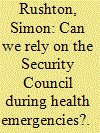

|
|
|
|
|
| Summary/Abstract |
In passing resolutions on HIV/AIDS, Ebola and COVID-19, the Security Council has shown at least a passing interest in health, and calls have been made to give it a more central role in global disease response. In this contribution, reflecting on two decades of the UNSC’s engagement with health emergencies, I suggest we should be cautious about making the Security Council too central to pandemic response. I focus on three problems with the Council: that it is highly politicised and deeply divided in ways that mean it cannot be relied on to act when needed most; that when it does act it tends to do so too late, once an emerging problem has already become a global crisis; and that it does not in any case necessarily have the tools at its disposal to make a meaningful contribution. Instead, I argue, it is precisely its role as a ‘health outsider’ that enables the UNSC to occasionally make a contribution. It would be risky indeed to hand such a body real responsibility for crisis response. That is a task much more likely to be performed assiduously (if often imperfectly) by a body such as the WHO.
|
|
|
|
|
|
|
|
|
|
|
|
|
|
|
|
| 2 |
ID:
144240
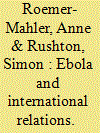

|
|
|
|
|
| Summary/Abstract |
The outbreak of Ebola Virus Disease (EVD) that gripped Liberia, Guinea and Sierra Leone through much of 2014 and 2015 was an enormous and in many ways unprecedented health emergency. Yet the outbreak was not only a global health event – it was also a global political event. In this introduction to the special issue we discuss the contribution that International Relations scholarship can make to analysing and understanding the Ebola outbreak and the global response to it. We group our comments around four key themes: (1) allocating responsibility in a diffuse global health governance system; (2) the causes and effects of Ebola being perceived as a global crisis; (3) the downsides of a security-driven approach to global health emergencies; and (4) issues of inequality both between and within countries, including those around gender, resources and power.
|
|
|
|
|
|
|
|
|
|
|
|
|
|
|
|
| 3 |
ID:
067374


|
|
|
| 4 |
ID:
141059


|
|
|
|
|
| Summary/Abstract |
Ideas of smart power and Global Health Diplomacy have developed considerable prominence over the past decade in, respectively, the foreign policy and public health communities. Although in some respects separate, both suggest the potential for using health assistance to generate political as well as health benefits. The conflicts in Iraq and Afghanistan provide an opportunity to examine these assertions at the ‘sharp end’. We consider both the health and wider strategic benefits of health assistance in these conflicts, as well as some of the ethical challenges involved. We conclude however that we should adopt the precautionary principle because: there is doubt over the quality of health services provided in such circumstances; concern over the wider effects of politicising health aid; and little proof that the claimed strategic benefits materialise in practice.
|
|
|
|
|
|
|
|
|
|
|
|
|
|
|
|
| 5 |
ID:
095127
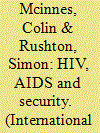

|
|
|
|
|
| Publication |
2010.
|
| Summary/Abstract |
HIV/AIDS is one of the greatest single causes of death and suffering on the planet. Over the last decade the societal impact of HIV/AIDS has been widely discussed in terms of national and international security. This article assesses the securitizing move and suggests that HIV/AIDS was only partially securitized at best and both the political consensus and strength of evidence were overestimated. It argues for greater nuance in our understanding of the link between HIV/AIDS and security, and the effects of its securitization, suggesting that neither is straightforward, and both are subject to case sensitivities.
|
|
|
|
|
|
|
|
|
|
|
|
|
|
|
|
| 6 |
ID:
172108
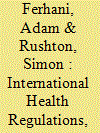

|
|
|
|
|
| Summary/Abstract |
It is often said that “diseases know no borders,” but COVID-19 has once again shown that policy responses certainly do. Governments have implemented bordering practices in a variety of ways to ensure that their own citizens are protected, even when in direct contravention to the International Health Regulations (IHR) of 2005. The IHR and the World Health Organization (WHO) have a strong preference for borders to remain open. Yet, we argue here, non-compliance by WHO member states is not the only problem with the IHR's treatment of borders. Bringing insights from critical border studies and exploring the varied ways in which the response to the COVID-19 crisis has been “bordered,” we argue that a much broader understanding of “borders” is required in the IHR and by the WHO, given that much of the exclusionary bordering we find takes place away from physical points of entry.
|
|
|
|
|
|
|
|
|
|
|
|
|
|
|
|
| 7 |
ID:
159205


|
|
|
|
|
| Summary/Abstract |
This article uses the ongoing policy debate over “harm reduction” as a lens for examining the complex relationships between global health governance and the global governance of other issue areas—in this case, the global narcotics control regime. Examining the dynamics of policy entrepreneurship at this interface, I argue that both material and ideational power matter, and that there is a need to better understand the potential influence that global health institutions have in other policy spheres and the extent to which framing can be a successful advocacy strategy. Without denying the potential for policy entrepreneurship, I argue that this case offers some insights into how power and influence operate at such interfaces, which can be important in better understanding the potential for global health institutions to successfully promote pro-health policies.
|
|
|
|
|
|
|
|
|
|
|
|
|
|
|
|
| 8 |
ID:
109870
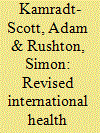

|
|
|
|
|
| Publication |
2012.
|
| Summary/Abstract |
This paper takes a constructivist approach to examining one of the new norms embodied in the recently revised International Health Regulations (IHR). The paper focuses on the provisions that seek to restrain states from applying disproportionate international travel and trade restrictions in response to a disease outbreak occurring in another country. This new norm, which aims to limit unjustified 'additional health measures', has significant implications for state sovereignty. Using the example of the 2009 H1N1 'swine flu' pandemic, the paper examines whether state behaviour and the discourse surrounding that outbreak supports a constructivist contention that a new norm has been created and that most states can be expected to comply with that norm most of the time. We conclude by discussing what the discourse over H1N1 suggests about the extent to which the new norm concerning additional health measures has been internalized by states.
|
|
|
|
|
|
|
|
|
|
|
|
|
|
|
|
| 9 |
ID:
187522


|
|
|
|
|
| Summary/Abstract |
Since 2000, health issues have increasingly been discussed at the UN Security Council (UNSC) without consensus being built on how and when the Council address health topics, or on its role in global health governance. As the contributions in this issue show, high-profile infectious disease outbreaks as well as the disruption of healthcare delivery and assistance in conflict settings have driven the health agenda at UNSC debates, but that agenda has remained ad hoc. Health topics seem most likely to be put on the agenda when the P5 perceive a particular health issue as a threat to international peace and security, or when the social and economic consequences of a health crisis potentially destabilise countries or regions. That raises another political question, however: under what circumstances are they likely to perceive health issues in those terms, and whose interests are being prioritised in such a determination?
|
|
|
|
|
|
|
|
|
|
|
|
|
|
|
|
|
|
|
|
|